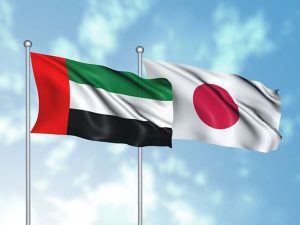TOKYO / WAM
A high-level delegation from the United Arab Emirates, comprising representatives from the Federal Authority for Nuclear Regulation (FANR) and Cleveland Clinic Abu Dhabi, conducted an official visit to Japan to enhance bilateral cooperation in advanced radiotherapy—particularly heavy ion therapy—as well as in related regulatory, healthcare, and research practices. Led by Christer Viktorsson, Director-General of FANR, the visit aimed to gain in-depth insights into Japan’s leadership in heavy ion therapy, including regulatory frameworks, operational practices, safety protocols, and training programs required to build national capacity for utilising such technologies.
During the visit, the UAE delegation held high-level meetings and technical exchanges with key Japanese institutions, including Yamagata University’s Heavy Ion Medical Center, the National Institutes for Quantum Science and Technology (QST), the Nuclear Regulation Authority (NRA), and Nuclear Damage Compensation and Decommissioning Facilitation Corporation. The visit follows the UAE’s recent announcement to establish the region’s first heavy ion therapy center at Cleveland Clinic Abu Dhabi, a landmark initiative that underscores the country’s commitment to advancing cancer care and positioning Abu Dhabi as a hub for world-class oncology services.
Christer Viktorsson, Director General of FANR, said, “This visit reflects FANR’s commitment to ensuring the safe and effective use of radiation in medicine through global collaboration. Japan’s experience in advanced radiotherapy and regulatory oversight offers valuable lessons that will help realise the UAE’s vision of becoming a leader in healthcare innovation, strengthening its knowledge-based economy, and promoting medical tourism. Integrating such state-of-the-art technologies enhances the UAE’s global standing in both healthcare and scientific research.”
Heavy ion therapy is an advanced form of radiotherapy known for its precision and efficacy. It delivers high doses of radiation directly to cancer cells while minimising damage to surrounding healthy tissue. The treatment is especially effective for inoperable or treatment-resistant tumours, such as large cancers or liver metastases, and is associated with reduced treatment frequency and lower risk of secondary cancers.
The UAE delegation’s discussions also covered regulatory licensing and oversight requirements, safety and operational standards, and the training frameworks needed to ensure a skilled workforce capable of safely managing such sophisticated technologies. This visit forms part of FANR’s ongoing efforts to strengthen international cooperation and uphold the highest standards of safety, security, and transparency in the UAE’s nuclear and radiation sectors.
 The Gulf Time Newspaper One of the finest business newspapers in the UAE brought to you by our professional writers and editors.
The Gulf Time Newspaper One of the finest business newspapers in the UAE brought to you by our professional writers and editors.
